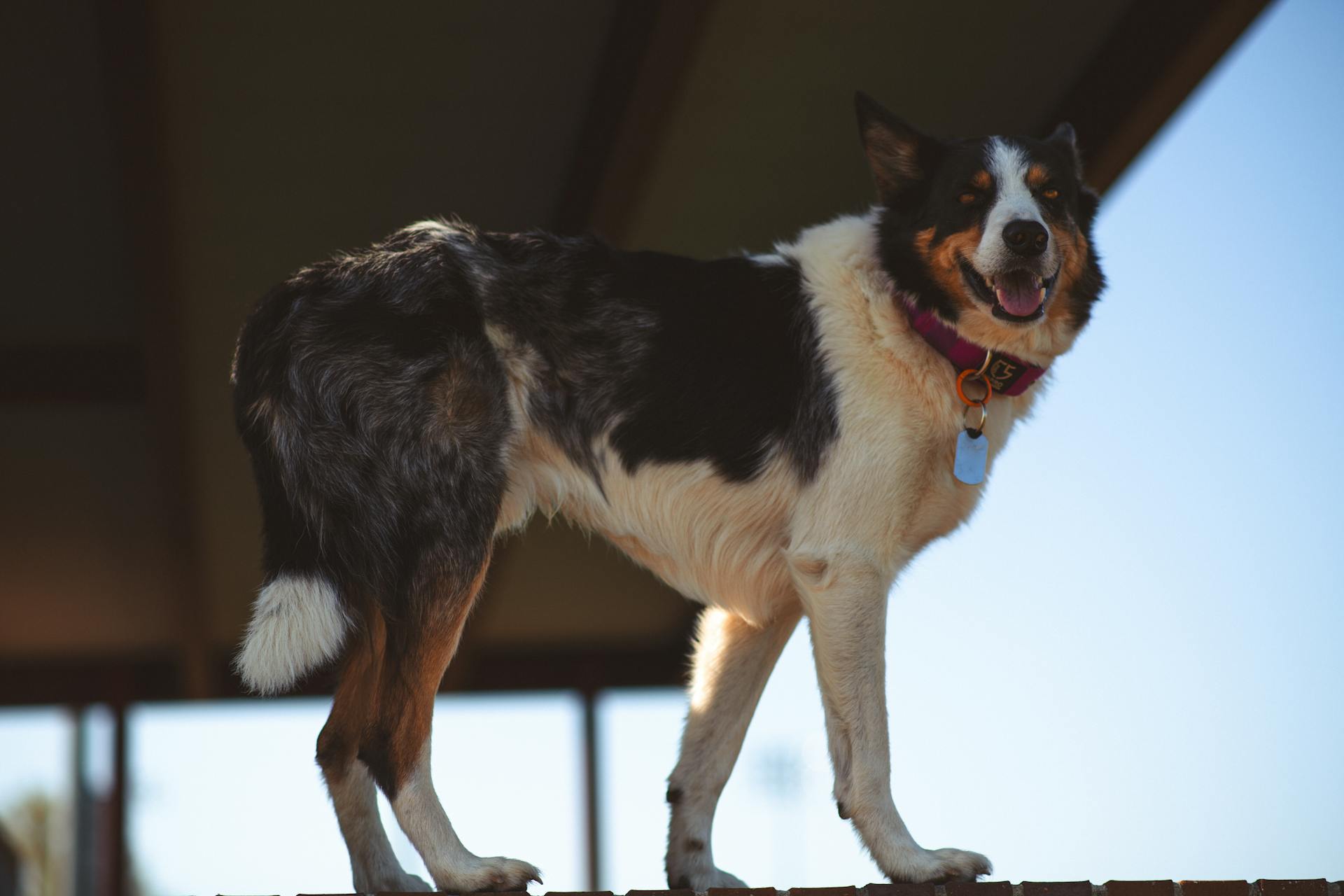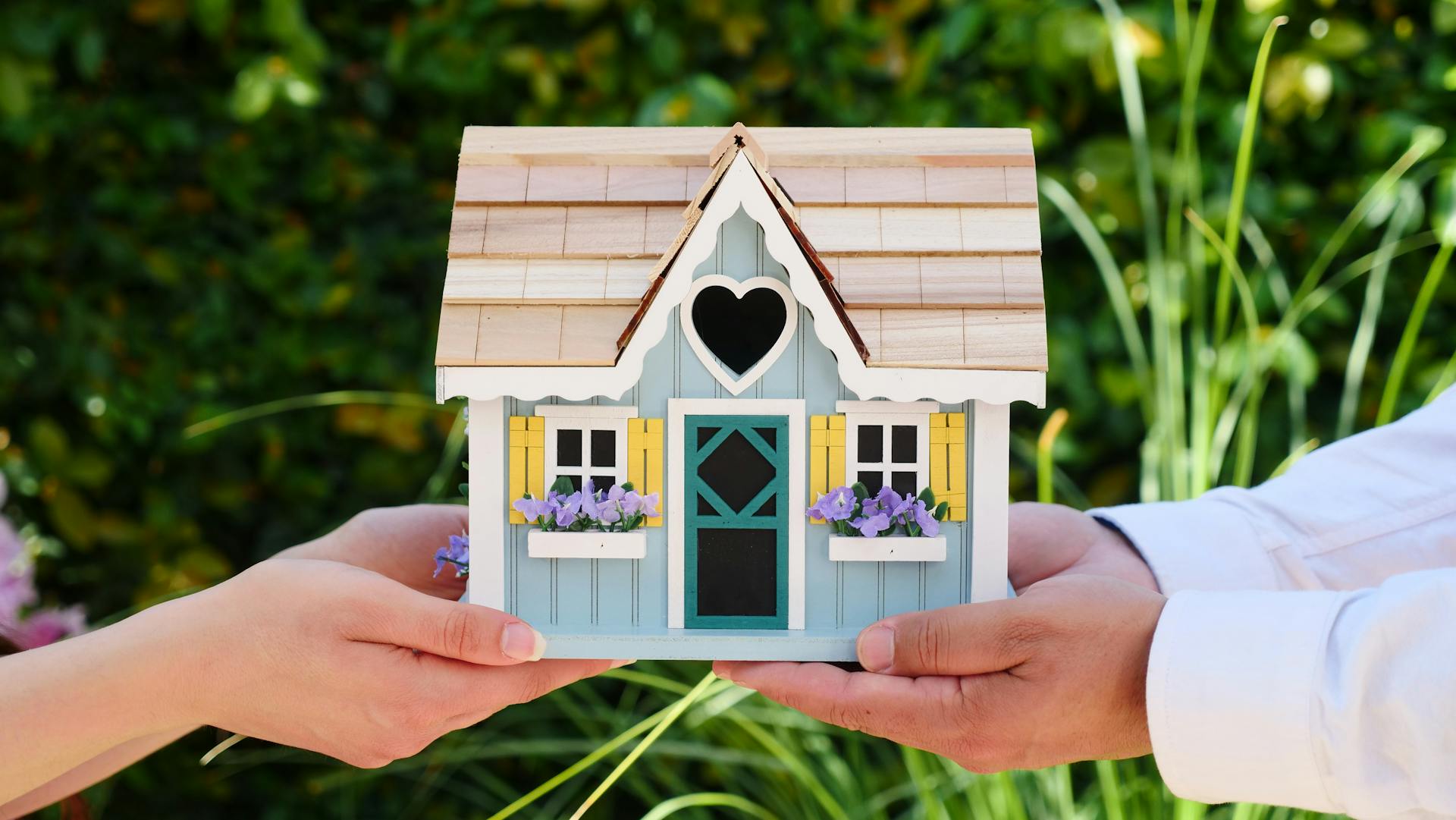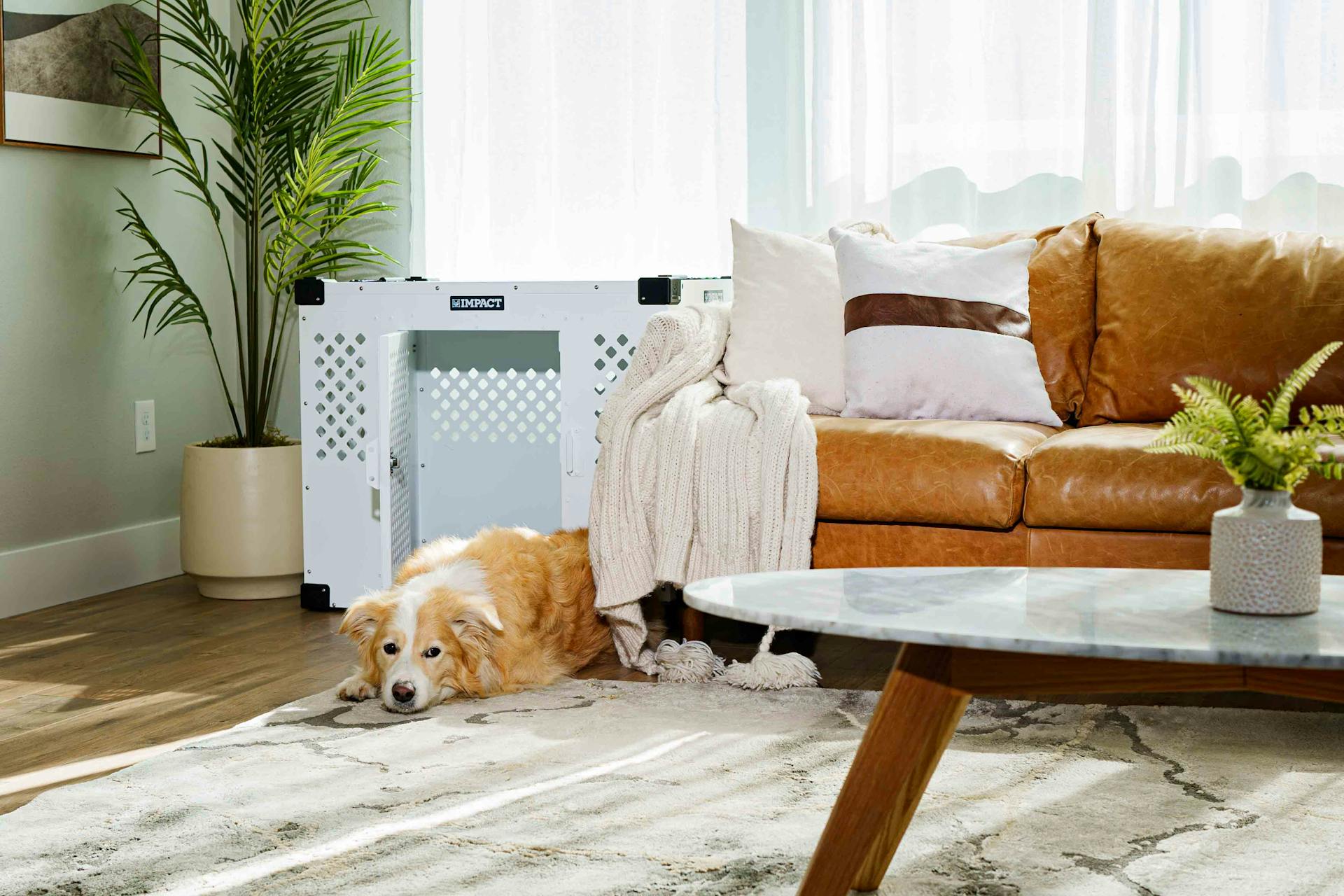
Mini Aussies and Toy Aussies are often used interchangeably, but technically, a Toy Aussie is a smaller version of the Mini Aussie.
The Mini Aussie typically weighs between 15-30 pounds and stands between 14-18 inches tall at the shoulder.
Both Mini Aussies and Toy Aussies are known for their friendly and outgoing personalities, making them great family pets.
Their intelligence and high energy levels mean they require regular exercise and mental stimulation to prevent boredom and destructive behavior.
Suitability
They make great family dogs, but some factors may not be suitable for everyone. Mini Aussies need regular grooming to remove dead hair and debris, so they should be groomed at least once a week.
They require a lot of physical activity, which is ideal for families with a yard to play in. However, they can still thrive in apartment life if taken for enough walks and given enough exercise.
If you work a lot, it's essential to keep your Mini Aussie busy to prevent them from becoming pushy and irritable. This can include training them in jobs to do, so they don't get bored or destructive.
They're much better suited for families than for people living alone, as they love having company and people to play with.
On a similar theme: Dog Play
Suitability of Aussies for Families
Aussies make great family dogs, but they do require regular grooming, at least once a week, to remove dead hair and debris.
They need a lot of physical activity, so it's ideal to have a yard for them to play in, but if you don't have a yard, taking them for enough walks and exercise can make up for it.
If you work a lot and don't have time to train your Aussie, they can become pushy and irritable, barking a lot or even destroying furniture.
Aussies are much better suited for families than for people who live alone, as they love having company and people to play with.
Their high energy level can startle young kids, and their strong herding instincts can cause them to herd children and nip at their heels, so early training and socialization are crucial.
Are Apartment Dogs?
Living in an apartment can be a great option for dog owners, but it's essential to consider the needs of your furry friend. Toy Australian Shepherds, for instance, have a lot of energy and require regular exercise and mental stimulation.
A backyard is ideal, but if that's not possible, a daily routine of training, games, and problem-solving activities can keep them happy and healthy.
Care and Grooming
Caring for your Miniature Australian Shepherd requires daily exercise and mental stimulation, with at least 30-60 minutes of activity daily and a job to keep them entertained.
They need regular grooming, with daily brushing to prevent matting and keep their double-layered coat healthy. You can use special brushes designed for their coat type.
These dogs shed a lot, so be prepared for regular grooming sessions. They'll also need regular vet checkups to monitor their overall health.
For feeding, Miniature Australian Shepherds require a diet of main meat, split into 2 meals per day, with around 2 cups of dry food total.
Do Shed?
The toy Australian shepherd is a heavy shedder, shedding throughout the year. This means you'll need to get used to finding dog hair on your clothes and furniture.
Their double coat is made up of a weather-resistant top coat and a fluffy undercoat, which contributes to their shedding. You'll need to brush their fur frequently to remove trapped undercoat fur.
In the spring and fall, toy Aussies experience two heavy shedding periods, also known as blowing their coat. This is when you'll need to brush their fur even more frequently.
The good news is that regular brushing can help reduce shedding.
See what others are reading: Mini Aussie Shepherd Shedding
Do You Need to Groom?
Grooming a Mini Toy Australian Shepherd requires regular attention, especially when it comes to their double coat.
Brushing your Mini Aussie every day is essential, especially with a double-layered coat that sheds a lot. You can use special brushes to make this job easier and more effective.
A consistent bathing and brushing routine from an early age is crucial for your Mini Aussie's coat health. Regular grooming can prevent common skin issues and matting.
Establishing a regular grooming routine helps your Mini Aussie adjust and accept the process more readily. According to the American Kennel Club, routine grooming can prevent common skin issues and matting.
The toy Australian shepherd has a relatively low maintenance coat that only requires a brush, ideally with a slicker comb, once or twice a week, with a wash every few months.
A different take: Mini American Shepherd Breeders California
Training and Behavior
Training and behavior are crucial aspects of owning a Mini Aussie or Toy Aussie. These dogs are highly trainable due to their intelligence and eagerness to please.
They thrive on mental stimulation, so daily training sessions are a must, but keep them short and fun to avoid boredom. Puzzle toys and canine sports can help keep their brains active.
Mini Aussies respond well to positive reinforcement techniques, such as treats and praise, which help build a strong bond between you and your furry companion. Consistency and patience are key when correcting unwanted behaviors, such as excessive barking or herding instincts.
Their independent streak can sometimes get the best of them, so make sure to teach new commands frequently to keep them engaged. With the right training and socialization, Mini Aussies can grow into well-mannered adults.
Suggestion: How to Train a Mini Aussie
What Is Temperament?
The toy Australian shepherd's temperament is a unique blend of loyalty, energy, and affection. They're a social breed that thrives on interaction with their humans.
These dogs have a strong work drive, which makes them excel in activities like agility and herding. They love being given a job and will do just about anything to please their favorite humans.
Their loyalty can sometimes be a double-edged sword, as toy Aussies are prone to separation anxiety if left alone for long periods. This can lead to destructive behavior if they're not provided with adequate attention and exercise.
Despite their high energy levels, toy Australian shepherds are incredibly affectionate and love to show their love through kisses, eye contact, and endless tail wags. They have a special talent for making their owners feel loved and appreciated.
Are Service Dogs?
The toy Australian shepherd is highly trainable, even-tempered, and loves having a job to do.
He excels at service work, particularly as a psychiatric service dog, therapy dog, and alert dog.
His ability to perform well in high-pressure environments and read his owner's mood changes and body language makes him a great fit for these roles.
The toy Aussie is particularly well-suited for tasks that don't require physical strength or size, such as providing emotional support or alerting his owner to changes in their environment.
Health Problems

As you start training your toy Australian shepherd, it's essential to be aware of the potential health problems they may face. Toy Australian shepherds are relatively healthy pups, but their active lifestyles do make them prone to physical injuries.
Hip dysplasia is a common issue in toy Australian shepherds, which can lead to arthritis and mobility problems later in life. Regular exercise and a balanced diet can help prevent or manage this condition.
Merle toy Australian shepherbs are more likely to suffer from eye problems and congenital deafness. This is something to consider if you're planning to breed your dog or if you're adopting a merle-colored toy Australian shepherd.
Multidrug sensitivity is another health issue toy Australian shepherds can experience. This is caused by a mutation of the MDR1 gene, which can lead to severe reactions to certain medications. If your dog has this condition, it's crucial to work closely with your veterinarian to find alternative treatments.
Epilepsy is a serious brain disorder that can cause repeated seizures in toy Australian shepherds. While it can't be cured, epilepsy can be managed with antiepileptic medication and a seizure action plan.
Discover more: Mini Aussie Health Issues
Training
Training your toy Australian shepherd requires a combination of positive reinforcement techniques and socialization from a young age. They thrive on mental stimulation and respond well to reward-based training methods, such as treats and praise.
Early socialization is crucial to develop a well-mannered adult, so make sure to expose your puppy to strangers and other dogs from an early age. This will prevent them from becoming startled or overexcited in public.
Daily training sessions are essential, but keep them short and fun to avoid boredom. Toy Australian shepherds have an independent streak and can get bored if the training isn't mentally stimulating enough.
Puzzle toys, canine sports, and other enriching activities can help work out their brains and prevent boredom. Consistency and patience are key when correcting unwanted behaviors, such as excessive barking or herding instincts.
Their high trainability and intelligence make them excellent service dogs, particularly for psychiatric service work, therapy work, and alert work. However, their small size means they're not suited for mobility assistance or crowd control tasks.
Are Energetic?
The toy Australian shepherd is a bundle of energy, despite its small size. Most pups require at least 60 minutes of exercise per day.
They need a lot of physical activity to thrive, in the form of runs, hikes, walks, and canine sports. This is crucial to keeping them happy and healthy.
If you're considering bringing a toy Aussie into your life, be prepared to invest time and effort into exercising them daily. With regular exercise, they'll be a joy to have around.
Their high energy levels also mean they benefit greatly from mental stimulation, such as training, games, and problem-solving activities. This will help keep them engaged and entertained.
Are Aggressive?
While toy Australian shepherds are rarely aggressive, their herding instincts can cause them to nip at peoples' heels.
Their herding instincts can be strong, but with proper training, you can curb this behavior.
Puppy classes can help with socialization and teach basic obedience, which can reduce nipping.
Redirecting the nipping by asking for alternate behaviors is also effective.
It's possible to teach your toy Australian shepherd to focus on toys or other acceptable outlets for their energy instead of nipping.
Bite inhibition training can help them learn to control their biting.
By combining these methods, you can raise a well-behaved and happy toy Australian shepherd.
If this caught your attention, see: Mini Aussie Shepherd Mix
Cost and Ownership
The cost of owning a mini Aussie or toy Aussie can be a significant factor to consider. The average price of a mini Aussie is between $800 to $1500 USD, while top breed lines can cost up to $10,000.
You can expect to pay around $1,500 to $2,500 for a toy Australian shepherd puppy, depending on factors like age, lineage, breeder, and coat characteristics. Puppies from reputable breeders with rare colors tend to sell for more.
Monthly expenses for caring for a toy Australian shepherd can range from $70 to $120, but this will ultimately depend on you and your pup's individual needs.
Cost Estimate

The cost of owning a Miniature Australian Shepherd can vary greatly, ranging from around $800 to $10,000, depending on factors like breed lines.
The price of a toy Australian shepherd puppy can be steep, typically falling between $1,500 to $2,500.
Caring for a toy Australian shepherd comes with its own expenses, with a monthly average of $70 to $120.
Can You Adopt?
Adopting a toy Australian Shepherd is possible, but it requires a bit of effort. You can reach out to organizations like the Australian Shepherd Club of America (ASCA), the United States Australian Shepherd Association (USASA), and the Australian Shepherd Association (ASA) to see if they have any toy Aussies available for adoption.
These organizations may have a network of breeders and owners who need to rehome their toy Aussies. If you're interested in adopting, you can also get in touch with breeders through the ASDR, as they may have a list of breeders who are rehoming their dogs.
If you're set on adopting a toy Australian Shepherd, here are some organizations to consider:
- Australian Shepherd Club of America (ASCA)
- United States Australian Shepherd Association (USASA)
- Australian Shepherd Association (ASA)
Frequently Asked Questions
What are the cons of a toy Aussie?
High energy levels and thick coats require regular exercise and grooming, which can be time-consuming and demanding. If not met, these needs can lead to destructive behavior and excessive shedding
Sources
- https://www.servicedogtrainingschool.org/blog/miniature-australian-shepherd
- https://dogacademy.org/breeds/toy-aussie
- https://www.1011now.com/2023/11/21/family-raises-mini-toy-australian-shepherds-west-point-farm/
- https://www.gunslingertoyaussies.com/knowyouraussie
- https://blog.tryfi.com/toy-australian-shepherd/
Featured Images: pexels.com

